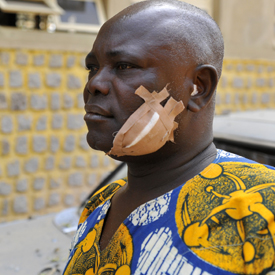Nigeria’s Christians face a grim new year
As Nigeria’s president declares a state of emergency after a fatal blast in Maiduguri, Anthony Tucker-Jones reports on the Nigerian Taliban’s attempt to spark a sectarian civil war.

Following the attacks on churches on Christmas day that killed at least 42 people, a bomb blast in the north-eastern Nigerian city of Maiduguri on Saturday killed an estimated four people. Nigerian President Goodluck Jonathan has declared a state of emergency in the areas worst affected by the Islamist group, Boko Haram.
If the Nigerian government does not get a grip on the situation the country is facing yet another bout of widespread sectarian violence. However, trying to keep law and order in a country as vast as Nigeria is no easy feat.
The country’s most senior Muslim, Muhammad Sa’ad Abubakar, the Sultan of Sokoto, has said there is no conflict between Nigeria’s Christians and Muslims.
Few though are blind to the longstanding tensions between the two communities. The latest attacks on Nigeria’s Christians are part of an escalating campaign by Islamist militants aiming to rupture the state along sectarian lines. Tragically the country is split between a largely Christian south and Muslim north.
Recent wave of bombings
The recent wave of Christmas day bombings struck churches in Damaturu, Gadaka, Jos and Madalla leaving some 40 dead. Around 30 Christian businesses were also burned to the ground. Government forces clashed with Muslim militants in the northern state of Yobe resulting in almost 70 dead and 90,000 people fleeing the violence.
In revenge for the Christmas day attacks a homemade bomb was thrown into an Islamic school in the Christian city of Sapele on 27 December, injuring six children and an adult. In the troubled Plateau State Muslim herdsmen shot three Christians during a raid.
Nigeria’s taliban
Boko Haram the organisation responsible for the bombings is known as Nigeria’s Taliban. The goal of the group, whose name translates as ‘no to western education’, is the implementation of Sharia law across the country and the creation of an Islamic state.
Their official Arabic name is Jama’atu Ahlis Sunna Lidda’awati wal-Jihad, which means ‘People Committed to the Propagation of the Prophet’s Teachings and jihad.’
The Nigerian Taliban is getting bolder and more ambitious. Its fighters have graduated from conducting drive-by killings of policemen and politicians to large scale suicide bombing.
During the summer of 2011, the commander of US operations in Africa, General Carter Ham, warned that Boko Haram is forging links with al-Qaeda in the Islamic Maghreb. It is also thought to have links with the Somali Islamist militant group al-Shabaab.
This violent militant group originates in Nigeria’s Muslim north and normally concentrates it activities in the northern states of Bauchi, Borno, Kaduna, Kano and Yobe.
Muslim cleric Mohammed Yusuf, formed Boko Haram about a decade ago in the north-eastern city of Maiduguri.He launched attacks in the north-eastern cities of Bauchi and Maiduguri in the summer of 2009 after some of his supporters were arrested by the federal authorities.
Spread of the terror campaign
Shortly after Yusuf was seized by the security forces and shot dead. The Nigerian Government hoped that this would decapitate the militants.
Instead in December 2010 there was a wave of bombings in central Nigeria. The month before the Nigeria authorities intercepted an arms shipment from Iran thought to be en route to Boko Haram. During the summer of 2011 Boko Haram internationalised is terror campaign by suicide bombing the UN headquarters in Abuja killing 23 innocent people.
The Police and the Security and Civil Defence Corps only number 82,000, while the Nigerian Army is even smaller with just 62,000 men under arms; they are expected to protect a population in excess of 130 million.
The Nigerian Taliban is getting bolder and more ambitious. Its fighters have graduated from conducting drive-by killings of policemen and politicians to large scale suicide bombing.
Clearly Boko Haram’s bloody strategy does not bode well for the country’s fragile stability.
Anthony Tucker-Jones is a freelance defence writer and an expert on regional conflicts. He is also the terrorism and security correspondent for intersec – The Journal of International Security.
-
Latest news
-
‘Russian aggressions have never pushed Georgia to deviate from its own path’, says Georgian President5m

-
Why is Georgia’s ruling party so intent on adopting ‘foreign influence’ bill?5m

-
Trump’s lawyers try to paint Michael Cohen as liar out for revenge at trial3m

-
England’s schools told not teach gender identity2m

-
Slovakia PM shooting: Suspect charged with attempted murder3m

-




